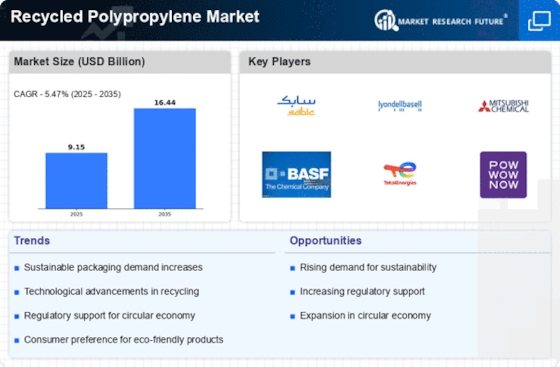Top Industry Leaders in the Recycled Polypropylene Market

Recycled Polypropylene Market
The recycled polypropylene (R-PP) market is experiencing dynamic growth, driven by rising environmental concerns and the increasing adoption of circular economy principles. this market presents a fertile ground for competition, prompting players to strategize and innovate to secure their foothold. Let's delve into the intricacies of this landscape, exploring key strategies, market share drivers, industry news, and recent developments.
Strategic Maneuvers for Market Supremacy:
-
Vertical Integration: Leading players like LyondellBasell and Borealis are integrating collection, sorting, and recycling capacities, aiming for greater control over the supply chain and cost optimization. -
Partnerships and Acquisitions: Strategic collaborations are on the rise, such as Veolia and Suez merging their plastic recycling activities to create a global leader. Acquisitions like Ravago's purchase of RES Polyflow bolster regional presence and expertise. -
Technological Advancements: Investments in sorting technologies, like AI-powered sorting systems, and chemical recycling processes enhance R-PP quality and consistency, widening its application scope. -
Geographical Expansion: Established players are venturing into emerging markets like Southeast Asia and India, where virgin plastic demand is high, offering potential for R-PP adoption. -
Sustainability Initiatives: Transparency and traceability through blockchain technology, along with carbon footprint reduction efforts, are crucial for brand differentiation and attracting sustainability-conscious customers.
Factors Shaking the Market Share Ladder:
-
Production Capacity: Companies with robust infrastructure and efficient recycling processes have an edge in meeting the growing demand for R-PP. -
Cost Competitiveness: Virgin plastic prices fluctuate, but stable and competitive R-PP pricing is crucial for wider adoption, especially in price-sensitive sectors. -
Product Quality and Consistency: Maintaining consistent quality through advanced sorting and processing technologies is essential for gaining trust from brand owners and manufacturers. -
Geographical Reach: A wider geographical presence, particularly in regions with high post-consumer plastic waste generation, offers a significant advantage. -
Sustainability Credentials: Strong environmental commitments, certifications, and transparent communication resonate well with environmentally conscious consumers and businesses.
Key Players
- MBA Polymers Inc. (Austria)
- Veolia Polymers NL B.V. (The Netherlands)
- SUEZ (France)
- Custom Polymers (US)
- Joe's Plastic (US)
- KW Plastics (US)
- Jayplas (UK)
- Ultra Poly Corporation (US)
- PLASgran Ltd. (UK)
- B&B Plastics Inc. (US)
Recent Developments :
April 2022, Faurecia, a FORVIA Group firm, and Veolia have signed a Cooperation and Research Agreement to develop novel materials for automobile interior modules, with the goal of reaching an average of 30% recycled content by 2026. The two firms will collaborate to expedite the deployment of sustainable solutions in instrument panels, door panels, and center consoles throughout Europe. Veolia will begin producing these secondary raw materials in 2024 with its existing recycling operations in France.
October 2022, at the K 2022 fair in Dusseldorf, Germany, Veolia debuted 'PlastiLoop,' a new brand of recycled plastics and services. Veolia's wide network of experts and its 37 plastic recycling plants across the world have made this innovative solution possible. Customers can choose from a wide range of ready-to-use recycled resins, including PET, PP, HDPE, PS, ABS, LDPE, and PC, with this new offering.
December 2021, in a circular economy approach, Veolia and L'Oréal have teamed together to lower the carbon footprint of cosmetic packaging. Veolia will thus provide high-quality recycled plastic for L'Oréal's packaging all over the world. After processing the plastic material present in waste resulting from consumer packaging, particularly plastic bottles, recycled plastic will be obtained.
In June 2024, NTU, a research-centered university situated in Singapore that undertook this innovation with its team of experimenters, came up with cool paint from recycled plastics and barium sulfate in June 2024. It is an ecological choice that effectively lowers the surface temperatures in the tropics as well as simplifies plastic waste management by eliminating the need for separation among multiple species of plastics.










